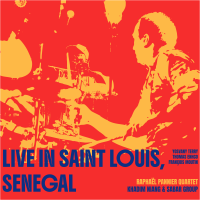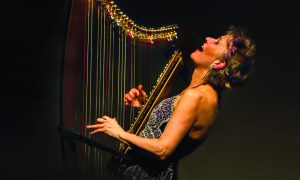The Troubadour, awash on a recent night in indigo light and chiming guitars, doesn't look all that different than it did in the 1970s, when music history plugged in to the club's stage amps and earned the tiny West Hollywood venue the audacity to relentlessly advertise itself as “the world-famous Troubadour."
The description still fits but, well, the world isn't as big as it used to be, not for the recording industry or the young musicians who come to Los Angeles with dreams of gold and platinum. There's an odd postwar feeling these days in some music-industry circles, a sense that the revolutionary front of the Digital Age knocked down all the familiar structures but forgot to build lasting new ones. At the same time, others see a ragged charm and wide-open opportunity in this new order.
The walls of the Troubadour's front bar -- the spot where future Eagles members Don Henley and Glenn Frey met -- are lined with framed photos of the storied past. The fact that Elton John, Bruce Springsteen, James Taylor, Pearl Jam, Linda Ronstadt, the Byrds, Metallica and so many others came to the club for key early career successes isn't lost on the new generation -- nor is the current situation of a recording industry that makes more money off its past than it does off its present.
“The path used to be clear -- you got a major-label deal, they got you on the radio, you toured and recorded albums," said Steven Scott, guitarist and singer in an L.A. band called the Afternoons. “Now all that has changed, really, and the new path is . . . well, what is it? And where does it go?"
Scott and his band mates took the stage at the Troubadour on a Thursday night last fall with the mix of scruffy confidence and theatrical aloofness common to indie bands with local success but a desire for more. The crowd was good and the seven-member outfit was sharp; the musicians barely fit on the famously cramped stage, but their swooning, layered sound (which seems somehow simultaneously informed by Pink Floyd and the Mamas & the Papas) filled the room, and even the frosty L.A. hipsters in the back swayed their shoulders and bobbed their chins.
This is the sort of band that would have clawed for any chance to perform for a major-label A&R executive just a decade ago, but now its focus is on the Internet -- which, no surprise, is the prized high ground in the contemporary music business -- and finding spark and tinder wherever it may be.
The Afternoons have also sought out public radio, film soundtrack opportunities, the art scene and even designer T-shirts to promote their music in a time when “American Idol" and its lottery of fame have replaced the follow-the-chart career rules of “American Bandstand" and “American Top 40."
“We don't really think of the major labels as something we need or need to pursue at this point," said drummer Brent Turner. “Everything these days is in flux, and you find your audience in different ways."
The Afternoons became a bit of a local sensation when graphic artist Shepard Fairey took an interest in their music and, fresh from his Barack Obama “Hope" poster, designed street posters for the band's first single, the buoyant “Say Yes."
Fairey gave the band's demo to an art collector with a considerable music pedigree -- Sex Pistols guitarist Steve Jones. Jones played the band on his radio show on Indie 103.1 (the now-defunct cutting-edge rock station), which was low in signal strength but high in tastemaker pulse.
Now the Afternoons are part of a group of young music acts participating in a new-model approach to the marketplace that may be quirky but is showing promise. “Art, fashion, live performance are the things that help us connect now," Scott said. “We think if people hear the music and what we have to say, then we can start a relationship with them. But the hard part is getting heard."
Rock is a hard place

























